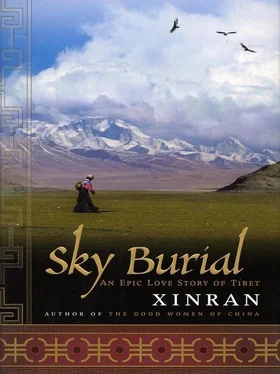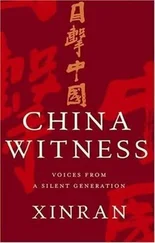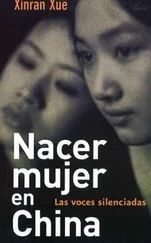When she heard how the family was planning to separate in order to help her, Wen wept. She didn’t know what to say. There were no words sufficient to express her debt to them. Not only had they rescued her from death, they had made her a part of their loving family for many years. Seeing Wen’s tears, Saierbao quietly took her hand and gently stroked it. Wen felt the roughness of Saierbao’s skin. She had aged. Her colorful clothes had faded, her ornaments were tarnished, but her face still shone.
Their parting was a solemn affair. Gela and Saierbao watched silently as Ge’er loaded the horses. Saierbao had prepared sacks of food and water-skins; there was a tent, bedding, rope, and medicines.
As Hum held the bridle of Wen’s horse for her to mount, he confided quietly to Wen that, as soon as Ge’er was back, he intended to enter a monastery as his brothers Ma and Me had done. He had reflected on Wen’s words about Kejun: he thought he understood what her love was like because, for him, the spirits were as the sun and moon.
Amid all the farewells, Wen removed the carnelian necklace Zhuoma had given her and pressed it into Saierbao’s hands, along with the old army uniform that she had never worn again. Images of Ni’s face filled Wen’s head. She knew that wherever she went, she would never forget the girl who had been like a beautiful wind chime, or the quiet love of her family.
DURING THEIR plans for the journey, Pad had suggested to Ge’er that they seek out the stonecutters who carved the mani stones on sacred mountains. These men were visited by all manner of people who wished to make an offering to the gods. Perhaps they would have news of any Chinese people who had passed that way in recent years. Ge’er agreed that this was how they should start.
For many months, their inquiries were fruitless. They traveled from mountain to mountain but none of the stonecutters that Ge’er talked to recognized Kejun’s photograph or had met any Chinese. Nor was Wen able to glean any information about what had happened to the People’s Liberation Army in this area of Tibet. “Is the conflict over?” she asked the people they met. They just looked at her strangely and did not reply.
Then, one day, they came across an old stonecutter who did recall having met some Chinese. Wen and Pad waited while Ge’er climbed the mountain to speak to him. When he returned, he reported excitedly that, many years ago, the stonecutter had seen a group of Tibetans pass by, among whom were some Chinese. They had all been wearing Tibetan robes but it had been easy to spot the non-Tibetan faces among them because they hadn’t been burned bronze by the harsh plateau sun. Each of them carried a rifle with a bayonet. There was a wriggling bundle on one of the horses. He had assumed that there was a live animal inside. The men had said they were heading northeast.
Wen and Pad looked at Ge’er in astonishment. Could these men have been Zhuoma’s kidnappers? Wen thought they should head northeast to see if they could gather more information, but Ge’er was anxious that they were abandoning the search for Kejun. Perhaps it would be better, he suggested, to travel toward the southeast, where, according to several of the people they had met, they would find many Chinese.
Wen gazed up into the deep blue sky, her hand on the photograph of Kejun in her breast pocket. “Zhuoma saved my life. We Chinese like to repay debts. I think if Kejun knew, he would want me to look for Zhuoma first.”
THE ROAD northeast would take them through high, windswept mountain passes. Ge’er warned Wen that it was only possible to cross the snowcapped mountains in summer, so they would have to wait out the winter at their foot. They spent the winter months in their tent, building up their strength and energy. Ge’er hunted antelope and other wild animals and gathered edible plants. He showed Wen and Pad how to recognize the medicinal roots that still clung to life in freezing temperatures.
In the spring, they set off again, traveling for days in near silence, concentrating on guiding their horses safely through the difficult terrain. Shortly after they had finally descended from the mountain ridge, they encountered a group of pilgrims. They wore long pieces of felt on their fronts and wrapped around their hands and feet. Wen soon saw the reason for this. After every step forward, the pilgrims prostrated their entire bodies on the ground so that even their foreheads touched the earth. They got up and repeated the whole full-body obeisance. Seeing Wen and her companions, the pilgrims stopped to rest. They said that they had been traveling for four months on a pilgrimage to Mount Anyemaqen. Wen knew that Anyemaqen was several weeks’ hard ride away. At the rate they were going, it would take them years. She wondered whether her own faith could sustain her in the same way.
AFTER THAT, they saw no one. Wen added another line to her diary, covering over words she had written many years earlier: “Help me, Kejun! I know you’re watching me-wait for me!”
Just as their food and water were about to run out, they spotted a tent. The three weary travelers were given a warm welcome by the nomad family and stayed with them for two days and nights. Wen could see that this family’s living conditions were very different from those of Gela’s family. They had plenty of semimechanized household and farming tools, a bicycle, and even a tractor. It had not occurred to her that the life of the Tibetan people could differ so much from place to place.
The head of the family explained that all these things had been bought from “truck shops” that had been traveling around this part of Tibet during the last few years.
“Are the shops run by the Chinese?” Wen asked.
“No, they are Tibetan merchants,” the man replied.
Ge’er was amazed by all the machines, gingerly prodding them. He couldn’t stop asking questions.
“What do these little iron things eat?”
“What do they do at night?”
“Do they ever get angry?”
“Can you ride a bicycle on the mountains?”
“How many pieces of dung can a tractor pull at once?”
Wen had never heard Ge’er talk so much.

BEFORE THEY set off again, their host asked them whether his son Zawang, who was also planning to go north, could travel with them. Ge’er was only too happy with this arrangement. An extra man in the party, and a young, strong one at that, would mean that the journey’s chores-fetching water and firewood, lighting cooking fires, putting up the tent, mending harnesses and saddles-would become much lighter.
The presence of Zawang changed their mood and relieved the monotony of the journey. Pad seemed particularly delighted by him. Wen had never known her to talk and laugh so much. Watching the two young people together, she and Ge’er often looked at each other and smiled.
Zawang was on his way to the renowned monastery of Wendugongba to see his older brother, who was a lama there. He hadn’t seen his brother for ten years because the monastery hadn’t permitted family visits during that time. His brother had needed all his attention to concentrate on learning to sew the intricate tapestries that the monastery was famous for. Zawang explained that, for these tapestries, pieces of fabric were sewn onto a padded background to create elaborate and beautiful pictures of the spirits. His brother’s work now hung upon the walls of the monastery. Wen was overcome by nostalgia for the embroidered clothes she had worn in the Yangtze delta-the padded silk jackets decorated with dragons and phoenixes in colored thread. She thought of her parents and her sister, who must, by now, believe that she was dead. She reached into her robe and touched the book that still contained her sister’s paper crane.
Читать дальше













